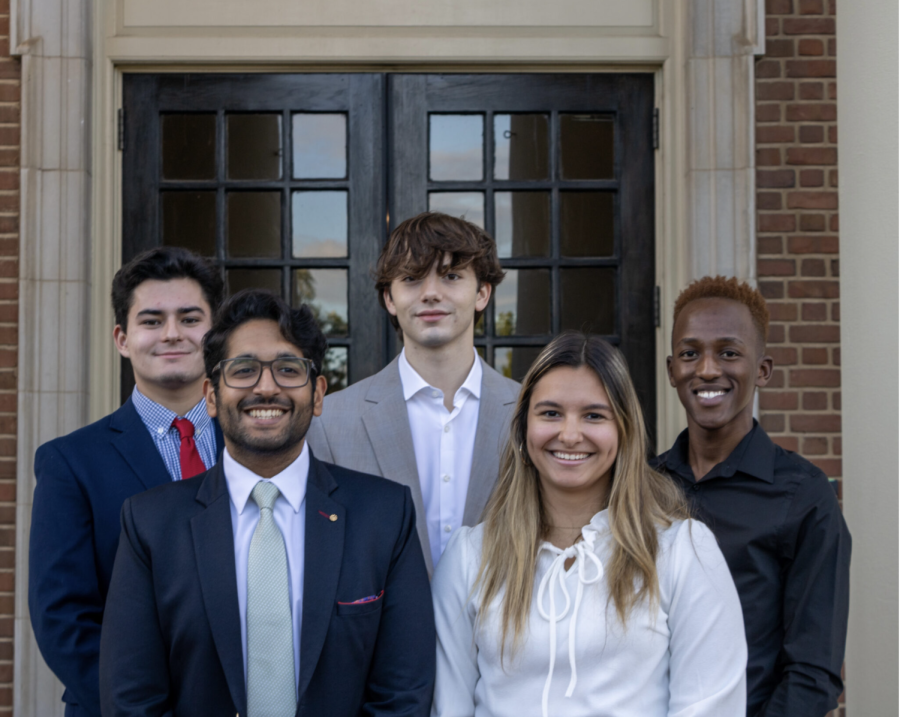Student Government establishes Student Organization Judicial Assembly
SOJA will operate as an independent judicial branch that senators say will strengthen Student Government processes
Courtesy of Student Government
The Judiciary Committee of Student Government poses for a picture. Connor Dier (leftmost) will not serve as a justice, Aman Khemlani (front left) will serve as chief justice pro tempore, Alondra Janicek (front right) will serve as chief justice. Associate justices will be Joey Crane (back center) and Jeffrey Ayako (back right).
February 1, 2023
Wake Forest’s Student Government Senate voted unanimously Tuesday to establish the Student Organization Judicial Assembly (SOJA) — an independent judicial branch composed of four associate justices and a single chief justice.
Effective immediately under the provisions of Senate Bill 2, SOJA will assume the authority of the former Judiciary Committee. New responsibilities include investigating the impeachment of a Senate or Executive Board member, providing impeachment recommendations to the Senate, attending Senate meetings when legislation is presented and overseeing appeals from the Elections Commission.
When asked how SOJA will impact the upcoming spring elections, Chief Justice Alondra Janicek (‘24) explained the new committee’s role in candidate appeals.
“In the short term, the only responsibility that we have outlined, in terms of elections, is to handle appeals,” Janicek said. “If a candidate receives an infraction or there is a decision made by the Elections Commission that the candidate does not like, that candidate can file an appeal. It will be up to SOJA to decide if they will hear that appeal. With the advice of a separate adviser, SOJA will decide what decision will be taken.”
The new committee will operate to combat bias in Student Government practices by redistributing power. Speaker of the House Jackson Buttler explained the importance of holding branches accountable.
“I think it’s really important that we as a student government have someone holding us accountable,” Buttler said. “And I think this accomplishes that really, really well. It also keeps us more in line with a lot of our peer institutions that have student governments that operate in this way, rather than the system that had originally been in place prior to this legislation passing tonight.”
Four of the current Judiciary Committee members, Janicek, junior Aman Khemlani, sophomore Joey Crane and freshman Jeffery Ayako will serve as SOJA justices. Janicek will serve as the chief justice and Khemlani will act as chief justice pro tempore. An informal application process will establish the remaining fifth member of the committee.
“We have to meet as a body to determine all of our processes,” Janicek said. “Regarding our makeup, who gets on SOJA will be different this year because we’re in a transition year. It will be a fully fleshed-out process, and it’s something we need to discuss as a committee.”
After Student Government holds formal elections in spring 2024, the five justices will serve from April 2024 to April 2025. Candidates, including former Judiciary Committee members, must reapply for a position each year. While students may serve as an associate justice for multiple terms, they may serve as chief justice only for a single year.
As former Judiciary Committee members prepare for their term as SOJA justices, they are tasked with outlining further responsibilities. Janicek explained how, during this transitional period, she and the other justices are open to suggestions from the student body and other members of the Wake Forest community.
“We’re open to whatever at this point,” Janicek said. “We are still in an experimental phase and have a lot of processes to build and a lot of foundations to build. We’re not really sure what the future holds right now.”
Student Body President Pilar Agudelo expressed her excitement about the new changes. When asked about the future of SOJA, she explained how the new committee is a stepping stone to important changes in Student Government that will impact the student body.
“We might want to consider that over the last 10 years, students’ engagement on campus has definitely changed,” Agudelo said. “This organization needs to match that change. There is definitely consideration about what else could happen in Student Government this year, next year and three years down the road, and that is important to building this organization to be the best body it can to support students.”
Aine Pierre contributed reporting to this story.















